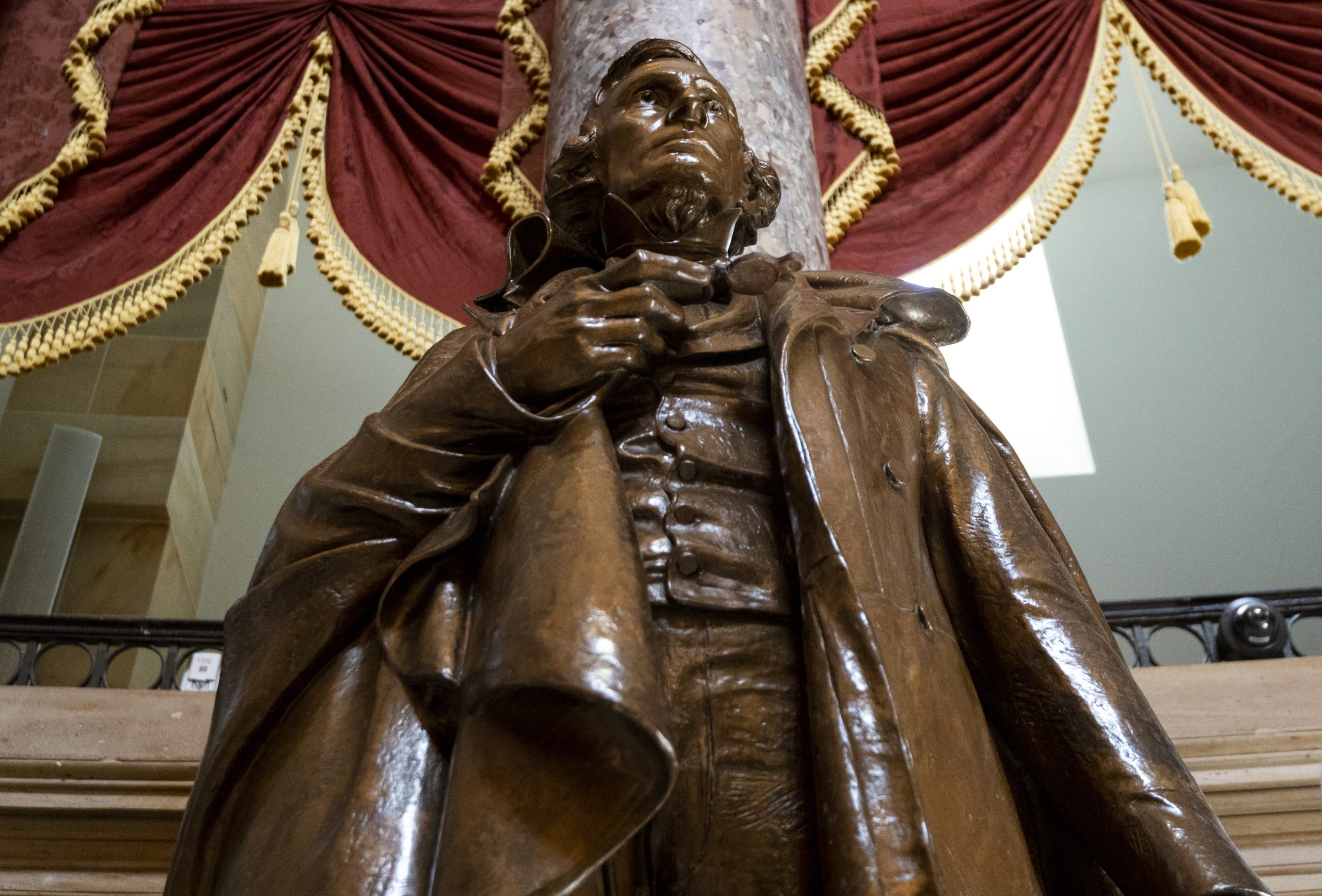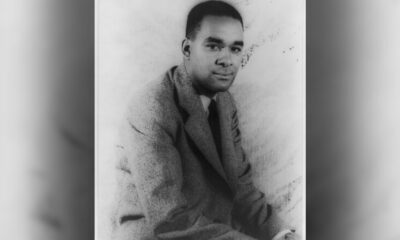Mississippi Today
Other Southern states removed white supremacist statues from Washington. Will Mississippi?

State lawmakers recently filed legislation to replace Mississippi’s two statues of white supremacists in the U.S. Capitol in Washington — a move that would follow the lead of several other Southern states.
House Minority Leader Robert Johnson III, a Democrat from Natchez, filed a resolution to replace statutes of Jefferson Davis and J.Z. George in the U.S Capitol’s National Statuary Hall Collection with statues of civil rights icon Fannie Lou Hamer and Hiram Revels, the first African American to serve in Congress.
Senate Minority Leader Derrick Simmons, a Democrat from Greenville, filed a measure to create a commission to select replacements for the Davis and George statues.
“I just don’t think having statues that represent the Confederacy is a correct representation of who Mississippi is,” Johnson said. “And I just think it’s time for change.”
Each U.S. state is allowed to place two statues of people “illustrious for their historic renown” or “distinguished civil or military services,” after Congress passed a federal law in the mid-nineteenth century establishing the national collection.
Around 3 to 5 million people pass through the collection in the Capitol each year, according to the Architect of the Capitol’s website, to glance at who are supposed to be the country’s most reputable figures.
But the leaders of the Magnolia State, who often boast about Mississippi’s literary, musical and artistic impact on the country, continue to honor the legacy of two slave owners who actively worked to maintain the white power structure of their day.
Both Davis and George were leaders of the Confederacy, and their vivid racism is well documented.
Davis served in the U.S. House and Senate from Mississippi before becoming the first and only president of the Confederate States of America, which fought to preserve slavery. Davis later said in a speech to the Mississippi Legislature that if he had the chance to change any of his past actions about secession, he would not do anything differently.
George was a member of Mississippi’s Secession Convention in 1861, and he signed the secession ordinance that included these words: “Our position is thoroughly identified with the institution of slavery — the greatest material interest of the world.”
George served in the Confederate Army and was also the architect of the 1890 Constitution that sought to reestablish white supremacy in the state and disenfranchise Black citizens from voting or holding elected office.
The Mississippians who initially honored George and Davis with statutes also had ties to the Confederacy or sympathized with the Confederacy.
A columnist at the time interviewed David Bramlette Jr., one of the men who selected Davis and George, and invited all Mississippians to attend the unveiling ceremony in Washington. The column specifically noted that “general officers of the Confederate organization” were invited to attend.
The article went on to quote Bramlette saying the reason the state honored George with a statue was because he was a “great constitutional lawyer and a leader in the preservation of the white, Anglo-Saxon civilization of the South.”
Many Southern states have replaced their original statues of Confederate leaders with more inclusive figures. Alabama, in 2009, replaced a statue of Jabez Lamar Monroe Curry, a Confederate officer, with one of Helen Keller, a political activist and disability rights advocate.
Arkansas is in the process of replacing statues of Uriah Milton Rose, a Confederate sympathizer, and James Paul Clarke, a former U.S. senator, with statues of civil rights activist Daisy Bates and musician Johnny Cash.
Florida, in 2016, approved a measure to replace Confederate Gen. Edmund Kirby Smith with Mary McLeod Bethune, a civil rights activist and founder of a Florida university.
Virginia, in 2020, removed Confederate General Robert E. Lee from the collection and plans to replace it with civil rights activist Barbara Rose Johns.
To change a statue, federal law requires a majority of lawmakers in both legislative chambers to vote to approve the replacement, and the state is required to pay for the costs of replacing the two statues.
Mississippi’s Republican committee leaders in the House and Senate were noncommittal about Johnson and Simmons’ proposals to change out the Davis and George statues.
House Speaker Jason White referred Johnson’s proposal to two committees for consideration: the House Rules Committee and the House State Affairs Committee. The measure must pass both committees before the entire House can consider it.
House Rules Committee Chairman Fred Shanks, R-Brandon, said he did not know much about the National Statuary Hall Collection, but that he would review Johnson’s proposal.
Lieutenant Governor Delbert Hosemann referred Simmons’ proposal to the Senate Rules Committee, which is led by Sen. Dean Kirby, R-Pearl.
“I’ll probably poll the committee and see where we are,” Kirby said. “If I see that it’s a real negative, I probably will not bring it up.”
Both Johnson and Simmons said they are open to suggestions for who should replace Mississippi’s statues, but they want it to honor someone who is more representative of a modern-day Mississippi.
“I want two individuals that when my children who are 5 and 10 can look back 50 years from now and they will say those two representations of Mississippi are still positive representations of Mississippi,” Simmons said. “The unfortunate thing is we can’t say that now.”
This article first appeared on Mississippi Today and is republished here under a Creative Commons license.![]()
Did you miss our previous article…
https://www.biloxinewsevents.com/?p=330744
Mississippi Today
On this day in 1945, Richard Wright’s memoir was top-selling book in U.S.
April 29, 1945

“Black Boy,” Richard Wright’s memoir about his upbringing in Roxie, Mississippi, became the top-selling book in the U.S.
Wright described Roxie as “swarming with rats, cats, dogs, fortune tellers, cripples, blind men, whores, salesmen, rent collectors, and children.”
In his home, he looked to his mother: “My mother’s suffering grew into a symbol in my mind, gathering to itself all the poverty, the ignorance, the helplessness; the painful, baffling, hunger-ridden days and hours; the restless moving, the futile seeking, the uncertainty, the fear, the dread; the meaningless pain and the endless suffering. Her life set the emotional tone of my life.”
When he was alone, he wrote, “I would hurl words into this darkness and wait for an echo, and if an echo sounded, no matter how faintly, I would send other words to tell, to march, to fight, to create a sense of the hunger for life that gnaws in us all.”
Reading became his refuge.
“Whenever my environment had failed to support or nourish me, I had clutched at books,” he wrote. “Reading was like a drug, a dope. The novels created moods in which I lived for days.”
In the end, he discovered that “if you possess enough courage to speak out what you are, you will find you are not alone.” He was the first Black author to see his work sold through the Book-of-a-Month Club.
Wright’s novel, “Native Son,” told the story of Bigger Thomas, a 20-year-old Black man whose bleak life leads him to kill. Through the book, Wright sought to expose the racism he saw: “I was guided by but one criterion: to tell the truth as I saw it and felt it. I swore to myself that if I ever wrote another book, no one would weep over it; that it would be so hard and deep that they would have to face it without the consolation of tears.”
The novel, which sold more than 250,000 copies in its first three weeks, was turned into a play on Broadway, directed by Orson Welles. He became friends with other writers, including Ralph Ellison in Harlem and Jean-Paul Sartre and Albert Camus in Paris. His works played a role in changing white Americans’ views on race.
This article first appeared on Mississippi Today and is republished here under a Creative Commons Attribution-NoDerivatives 4.0 International License.![]()
The post On this day in 1945, Richard Wright's memoir was top-selling book in U.S. appeared first on mississippitoday.org
Note: The following A.I. based commentary is not part of the original article, reproduced above, but is offered in the hopes that it will promote greater media literacy and critical thinking, by making any potential bias more visible to the reader –Staff Editor.
Political Bias Rating: Centrist
This article focuses on the historical context of Richard Wright’s memoir, “Black Boy,” and its impact on American literature and race relations. It presents facts about Wright’s life and work without taking an overt political stance. The tone is primarily reflective and factual, detailing Wright’s literary achievements and his contributions to addressing racial issues in America. The language is neutral and descriptive, with no evident bias toward either side of the political spectrum. It does not push a specific ideological agenda but instead highlights historical and literary significance.
Mississippi Today
Trump appoints former Gov. Phil Bryant to FEMA Review Council as state awaits ruling on tornadoes
President Donald Trump has appointed former Mississippi Gov. Phil Bryant to the FEMA Review Council, which Trump has tasked to “fix a terribly broken system” and shift disaster response and recovery from federal to state government.
The appointment comes as Mississippi awaits a response from the Trump administration on whether it will approve Gov. Tate Reeves’ request for a federal disaster declaration for deadly tornadoes in mid-March. The federal declaration, which Reeves requested April 1, would allow families and local governments devastated by the storms to receive federal assistance. Trump recently denied a similar request for Arkansas.
Trump has said states should shoulder more of the burden for disaster response and recovery, and he and Homeland Security Secretary Kristi Noem have threatened to shut down the Federal Emergency Management Agency altogether.
“I am proud to announce the formation of the FEMA Review Council, comprised of Top Experts in their fields, who are Highly Respected by their peers,” Trump wrote on social media. “… I know that the new Members will work hard to fix a terribly broken System, and return power to State Emergency Managers, who will help, MAKE AMERICA SAFE AGAIN.”
Trump listed other members of the council, including Secretary of Defense Pete Hegseth and Govs. Greg Abbott of Texas and Glenn Youngkin of Virginia.
Bryant, a longtime political ally of Trump, on social media wrote he is, “Honored to receive this appointment …” and that “Unfortunately, we’ve earned a lot of experience with natural disasters and recovery in Mississippi. Let’s Make America Safe Again.”
Mississippi saw seven deaths and an estimated $18 million in destruction from multiple tornadoes on March 14-15, the same storm system that caused damage in Arkansas. The Mississippi Emergency Management Agency reported that 233 homes were destroyed across 14 counties, and hundreds more were damaged.
During the initial aftermath, Reeves told reporters he believed there was a “high likelihood” the state’s damages from the March tornadoes would meet the threshold for FEMA’s Individual Assistance, which provides direct payments to disaster victims.
The Trump administration’s FEMA has denied federal assistance for flooding in West Virginia, tornadoes in Arkansas and a storm in Washington state, and refused North Carolina’s request for extending relief after Hurricane Helene.
After Hurricane Katrina’s devastation in 2005, Mississippi received nearly $25 billion in federal relief spending, which state leaders have credited with saving the state from ruin and allowing communities and families to rebuild.
This article first appeared on Mississippi Today and is republished here under a Creative Commons Attribution-NoDerivatives 4.0 International License.
Note: The following A.I. based commentary is not part of the original article, reproduced above, but is offered in the hopes that it will promote greater media literacy and critical thinking, by making any potential bias more visible to the reader –Staff Editor.
Political Bias Rating: Center-Right
The content presents a fairly neutral tone but leans towards a center-right perspective, particularly in its framing of President Trump’s actions and the appointment of former Mississippi Governor Phil Bryant. It highlights the argument for more state-level responsibility in disaster management, a position typically associated with conservative views. The reference to the Trump administration’s denial of federal assistance to certain states, including Arkansas, aligns with a more fiscally conservative stance that prioritizes reducing federal intervention. However, the mention of the substantial federal aid Mississippi received after Hurricane Katrina adds a historical balance to the perspective, indicating that the piece does not fully align with extreme conservative views.
Mississippi Today
Chris Lemonis fired, national search underway for Mississippi State baseball
Not quite four years after guiding Mississippi State to a baseball national championship, head coach Chis Lemonis has been fired, effective immediately.
Assistant coach Justin Parker will serve as interim head coach for the remainder of the season.
Mississippi State made the announcement in a press release Monday afternoon.
“A change in leadership is what is best for the future of Mississippi State baseball,” State athletic director Zac Selmon said. “We have not consistently met the standard of success that our university, fans and student-athletes expect and deserve. I want to thank Coach Lemonis for his work and the time he gave to our program, including a national championship in 2021. We appreciate his efforts and wish him and his family all the best moving forward.”
A national search is underway to identify the program’s next head coach, Selmon said.
“In a team meeting moments ago, I expressed to our student-athletes the confidence we have in their abilities and the potential they have for the remainder of the season,” Selmon said. “I encouraged them to compete with pride, resilience, and intensity. With the hard work, preparation, and talent already within this group, we are committed to putting them in the best position to finish the season competing at the highest level.
“Mississippi State is the premier job in college baseball. The tradition, the facilities, the NIL offerings and the fan base are all second to none. Dudy Noble Field is the best environment in the sport, period.”
The current Bulldogs have a 25-19 record and are 7-14 in the SEC. Most recently, the Bulldogs lost two of three weekend games to Auburn, the nation’s 11th-ranked team. State has lost its last two SEC series and five of seven this season. The Bulldogs are currently No. 45 in the nation in ratings percentage index (RPI) and are in danger of not making the NCAA Tournament for the third time in four years.
Lemonis’ MSU teams won 232 games and lost 135 in his six-plus seasons. Hired by former MSU baseball coach and athletic director John Cohen from Indiana, Lemonis has an overall coaching record of 373-226-2.
“This program is built for success,” Selmon said. “Our history proves it, and our future demands it. We are one of only four programs in NCAA history to reach the College World Series in six consecutive decades. With 40 NCAA Tournament appearances, 12 trips to Omaha, 11 SEC regular season titles, and a national championship, our program has always been a national contender. That is the bar. We’re going to find a leader who will embrace that, elevate our program and compete for championships.”
This article first appeared on Mississippi Today and is republished here under a Creative Commons Attribution-NoDerivatives 4.0 International License.
Note: The following A.I. based commentary is not part of the original article, reproduced above, but is offered in the hopes that it will promote greater media literacy and critical thinking, by making any potential bias more visible to the reader –Staff Editor.
Political Bias Rating: Centrist
The content provided is a straightforward news report about the firing of a baseball coach, Chis Lemonis, following his achievement of winning a national championship. The information is factual and does not indicate any political leaning, ideology, or bias. It is neutral in tone and intent.
-

 SuperTalk FM7 days ago
SuperTalk FM7 days agoNew Amazon dock operations facility to bring 1,000 jobs to Marshall County
-

 News from the South - Missouri News Feed3 days ago
News from the South - Missouri News Feed3 days agoMissouri lawmakers on the cusp of legalizing housing discrimination
-

 Mississippi Today2 days ago
Mississippi Today2 days agoDerrick Simmons: Monday’s Confederate Memorial Day recognition is awful for Mississippians
-

 Mississippi Today5 days ago
Mississippi Today5 days agoStruggling water, sewer systems impose ‘astronomic’ rate hikes
-

 News from the South - Georgia News Feed7 days ago
News from the South - Georgia News Feed7 days agoOrganization files ethics complaint against Warnock | Georgia
-

 News from the South - West Virginia News Feed5 days ago
News from the South - West Virginia News Feed5 days agoIs West Virginia — and the rest of the country — prepared to care for our seniors?
-

 News from the South - West Virginia News Feed7 days ago
News from the South - West Virginia News Feed7 days agoWork Zone Safety Week takes on extra meaning after recent WV worker's death
-

 News from the South - Louisiana News Feed5 days ago
News from the South - Louisiana News Feed5 days agoTaxes on vapes and smokeless tobacco advance through committee | Louisiana



















































